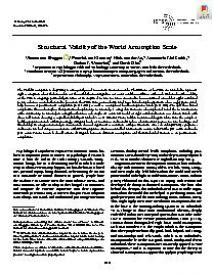Structural Validity of the World Assumption Scale
The World Assumption Scale (WAS) is a frequently used measure in trauma research. The 32 items of the WAS are intended to represent eight assumptions about the benevolence of the world, the meaningfulness of events, and the worthiness of the self. Debate about the validity of the WAS is ongoing, particularly in terms of its empirical factor structure; some studies have confirmed a model of eight correlated factors whereas several other studies have not.
The WAS items were administered to a clinical sample of patients who sought professional help because of posttraumatic complaints (n = 1,791) as well as a sample of healthcare professionals (n = 236). We split the clinical sample into three subsamples, then performed exploratory factor analysis using data from one subsample and tested the factor structure with confirmatory factor analysis using the other two subsamples.
A consistent model of eight correlated factors was demonstrated, with almost all factors showing acceptable reliability, Cronbach’s αs = .68–.84. We tested this factor model against data from the sample of healthcare professionals with increasingly stringent levels of invariance and found it to be scalar invariant (same structure, loadings, and thresholds). In a regression analysis, five factors showed significant associations with posttraumatic stress disorder (PTSD) symptoms, and two factors had unique associations with PTSD symptoms after we controlled for traumatic events: Self-Worth, β = −.31; and Luck, β = −.15. Future research should aim to distinguish between different assumptions and their individual influences on posttraumatic complaints.
In: Journal of Traumatic Stress, ISSN 0894-9867 ; eISSN 0894-9867 | 31 | 6 | December | 816–825
https://doi.org/10.1002/jts.22348


